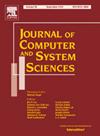禁止子图的复杂度框架IV:斯坦纳森林问题
IF 0.9
3区 计算机科学
Q1 BUSINESS, FINANCE
引用次数: 0
摘要
我们研究了无H子图上的斯坦纳森林,即不包含固定图H作为(不一定是诱导的)子图的图。与相关的斯坦纳树问题相比,斯坦纳森林问题不属于最近的一个框架,该框架完全表征了h-子图上许多问题的复杂性。因此,H-subgraph-free图上的Steiner Forest的复杂度是开放的。我们的主要结果是针对不同的排除图H的四种多项式时间算法,这是进一步理解其复杂性的核心。我们还研究了具有小c-删除集的图的斯坦纳森林的复杂性,即一个小的顶点集X,使得G−X的每个连接分量的大小最多为c。对于这个参数,我们给出了两种算法,我们稍后将其用作子程序(包括当c=1时更快的算法,即顶点覆盖数),并展示了二分定理。本文章由计算机程序翻译,如有差异,请以英文原文为准。
Complexity framework for forbidden subgraphs IV: The Steiner Forest problem
We study Steiner Forest on H-subgraph-free graphs, that is, graphs that do not contain some fixed graph H as a (not necessarily induced) subgraph. In contrast to the related Steiner Tree problem, Steiner Forest falls outside a recent framework that completely characterizes the complexity of many problems on H-subgraph-free graphs. Hence, the complexity of Steiner Forest on H-subgraph-free graphs remained open. Our main results are four polynomial-time algorithms for different excluded graphs H that are central to further understand its complexity. We also study the complexity of Steiner Forest for graphs with a small c-deletion set, that is, a small set X of vertices such that each connected component of has size at most c. For this parameter, we give two algorithms that we later employ as subroutines (including a faster algorithm when , that is, the vertex cover number) and exhibit a dichotomy theorem.
求助全文
通过发布文献求助,成功后即可免费获取论文全文。
去求助
来源期刊

Journal of Computer and System Sciences
工程技术-计算机:理论方法
CiteScore
3.70
自引率
0.00%
发文量
58
审稿时长
68 days
期刊介绍:
The Journal of Computer and System Sciences publishes original research papers in computer science and related subjects in system science, with attention to the relevant mathematical theory. Applications-oriented papers may also be accepted and they are expected to contain deep analytic evaluation of the proposed solutions.
Research areas include traditional subjects such as:
• Theory of algorithms and computability
• Formal languages
• Automata theory
Contemporary subjects such as:
• Complexity theory
• Algorithmic Complexity
• Parallel & distributed computing
• Computer networks
• Neural networks
• Computational learning theory
• Database theory & practice
• Computer modeling of complex systems
• Security and Privacy.
 求助内容:
求助内容: 应助结果提醒方式:
应助结果提醒方式:


